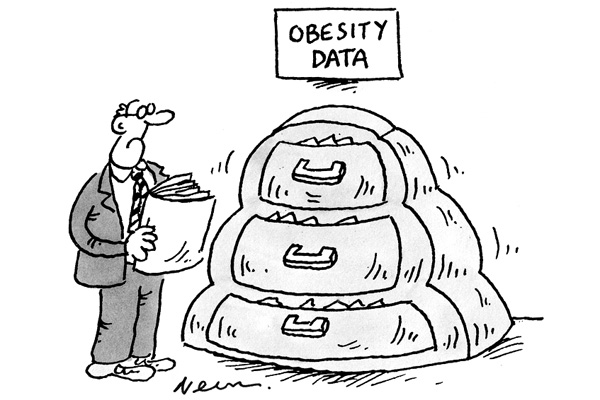The European Congress on Obesity is an annual treat for health journalists, because it guarantees a week of ready-made stories based on unpublished research announced at the conference. Although it only started yesterday, it has already produced such headlines as ‘Children who use smartphones at mealtimes more likely to be obese’ and ‘Children “bombarded by junk food adverts” on video game sites’. According to the Times, the latter study found that people who watch video game live streaming are ‘subjected to adverts for junk food and sugary drinks for 52 minutes of every hour’, which sounds rather unlikely.
Another finding from the conference made the Times’s front page today. Under the headline ‘UK sicknote culture is fuelled by obesity crisis’, readers are informed that obese people are ‘up to twice as likely to take time off work’. The unpublished research apparently found that people with a body mass index between 30 and 35 were 38 per cent more likely to be off work for a week or more for health reasons than people with a ‘normal’ BMI. The small number of people who are severely obese (with a BMI over 40) were 147 per cent more likely to take a week off work.
None of this is terribly surprising. Any health condition is likely to lead to sick days. But is it really true that, as an expert told the Times, obesity is the ‘root cause’ of health problems driving millions out of the workforce? There has certainly been a rise in worklessness since the pandemic. The number of people of working age who are economically inactive has risen from 8.5 million to 9.4 million. This includes 2.8 million people who say they are too sick to work. Almost all of the increase in economic inactivity is explained by this rise in long-term sickness.
Is obesity the ‘root cause’ of the problem? It seems unlikely. Despite obesity rates rising for several decades, there had been no increase in the number of people off work with long-term illness since the 1990s. Between 2000 and 2019, the number actually fell – from 2.3 million to 2 million, but since 2020 another 800,000 people have suddenly joined their ranks. Long Covid may account for some of them, but the main driver has been mental health, as Kate Andrews explained in February:
‘According to the ONS’s latest report, 53 per cent of people registered inactive with long-term sickness at the start of last year were reporting depression, bad nerves or anxiety as their main ailment, with the vast majority (more than a million) reporting one of these as a secondary health condition. Of those people assessed by welfare advisers, 80 per cent were categorised as too severely unwell to do any work at all. The ratio has doubled in the past decade.’
One can speculate about the reasons for this. Is it the longterm damage of lockdowns? Are they malingerers? Is the tax system disincentivising work? Whatever the reason, it is mental health rather than physical health that is behind the rise in long-term sickness. There is no evidence that it is being driven by obesity and the study from the European Congress on Obesity does not add much to the debate because it only looks at people who are already in work.
Of course there are productivity costs from people taking a few days off sick, but it is a trivial issue compared with the complete economic inactivity of long-term sickness. A 40 per cent increase in the number of people permanently signed off sick in the space of just four years requires some serious thinking. Instead, the co-author of this study says that we need to place restrictions on ‘ultra-processed food’ and the Labour party says that it will ban ‘junk food ads targeted at children’. Politicians are never happier than when talking about their next ban but on this issue, as with so many others, it is a displacement activity that ducks the real problem.







Comments